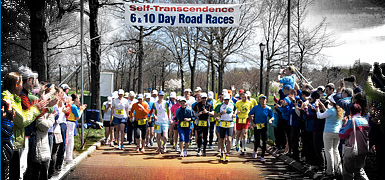If you are reading this article, chances are you will be traveling overseas for at least one race this season.
By Priscilla Fraiegari
March 8, 2005 -- If you are reading this article, chances are you will be traveling overseas for at least one race this season. As such, you should be aware of jet lag and how it might affect you. According to the Merriam-Webster Medical Dictionary, the scientific explanation of jet lag is"a condition that is characterized by various psychological and physiological effects (such as fatigue and irritability), occurs following long flight through several time zones, and problems result from disruption of circadian rhythms in the human body." Simply stated, jet lag means you could suffer from grogginess or irritability and experience trouble sleeping. All of which could affect your race-day performance.
While there is no proven formula for avoiding jet lag, there are a few guiding principles to help minimize its effects. Deepak Patel, president of Premium Plus Sports and an expert in overseas travel, offers the following tips to keep you from lagging once you reach your destination.
Get a good night's rest the night before you travel: Pack as early as possible, be sure you have your itinerary, passport and any other documents you might need and hit the sack. Travel days are usually very long, and it helps if you start the day well-rested.
Avoid alcohol: You have worked very hard preparing for this race, so it is doubtful you would jeopardize your race-day performance by knocking back a few cold ones during the flight. However, on the off-chance turbulence causes you to bump your head and you crave something a little stronger than water, reach for fruit juice or a non-caffeinated beverage. It will help to keep you hydrated. Note to self:"Beers, wine and any other spirits should be part of your post-race celebration only."
Stay hydrated: High altitudes and low humidity can cause dehydration. Be sure to drink plenty of water or juice frequently throughout the flight. Patel suggests eight ounces of water for every hour you are in the air. Avoid diuretics such as coffee, tea, cola and alcohol, which can further drain moisture from your system. If you really must have that Coke or cup of coffee, be sure to drink extra water or juice to counteract its effects.
Get some exercise: We're not talking wind sprints in the aisles. Rather, be sure to get up every couple of hours to stretch your legs and back. Walking to and from the restroom is usually a good way to accomplish this. If you are vigilant about keeping hydrated, your bladder will remind you to get up and move. Gentle stretching, such as rotating your ankles or rolling your shoulders, also helps in fighting fatigue.
Eat light meals: When taking long flights it best to avoid foods that are heavy or high in salt. These foods contribute to fatigue. Pack light, healthful snacks, like fruit and nuts, to nosh on throughout the flight.
Get comfortable: Once you've stowed your carry-on bag, it is time to get comfortable. Snag a pillow and blanket as soon as possible, put on a sweater or jacket if you are feeling chilly, kick off your shoes and sit back. One caveat, however, about kicking off your shoes: be sure you wearing socks to keep your feet from getting cold. Besides, do you really want to be walking up and down those airplane aisles with bare feet?
Relax: You've settled in and there is nothing else to worry about until you reach your destination. This is the perfect time to relax. Curl up with that book you've been dying to read, listen to your favorite CDs or watch a movie.
Freshen up: About an hour or so before reaching your destination, freshen up a bit by brushing your teeth and splashing your face with cool water. If you are arriving at a warm destination, peel off the layers you put on to keep warm during the flight.
Set your watch to your destination time: Setting your watch to your destination time during the flight mentally prepares you for what you should be expecting once you reach your destination. If you are arriving at lunchtime, expect to eat lunch.
Get acclimated to your new schedule: Take it easy on the day you arrive, but do your best to keep on local time. After you've checked into your hotel, take a shower and freshen up, unpack your bags and gear, and then head out to explore the area. The fresh air and walking will do you good. Patel says going for a quick run, hooking up with friends or going grocery shopping are also good ways to help keep you going. If you arrive in the early morning, you may be able to sneak in a quick nap- Patel suggests no more than 30 minutes. However, it is probably best to resist the temptation to nap and turn in early, if need be, that evening.
One of the best ways to counteract any affects of jet lag is to enjoy the local culture and scenery. Travel safe and have a great time.
This article was produced courtesy of Premium Plus Travel, a Chicago-based travel company that caters to endurance athletes.




